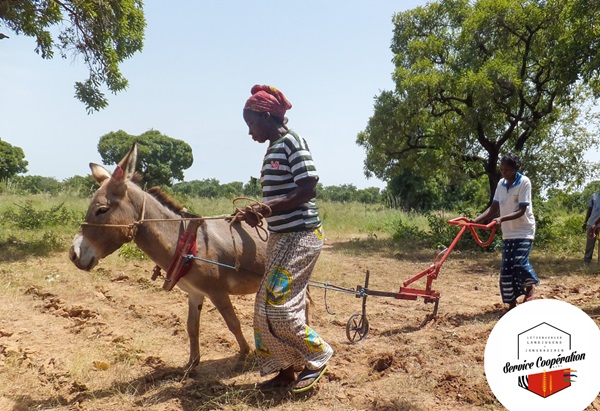 Credit: LLJ
Credit: LLJ
Chronicle.lu recently had the opportunity to talk with Marie-Claude Dornseiffer-Marx, Vice President, and Waltraud Toews, Communications Officer, about the Luxembourgish Young Farmers Association (Lëtzebuerger Landjugend a Jongbaueren Service Coopération Asbl - LLJ), a local non-profit organisation working to support farmers in Burkina Faso.
The almost 40-year-old NGO launched a new project in December 2023, aiming to support the local Burkinabe population and help them become more independent. Chronicle.lu reached out to find out more about the association’s story and current project.
Chronicle.lu: When was your association founded? What is its focus?
Marie-Claude & Waltraud: The origin of LLJ-Service Coopération Asbl goes back a long way. In 1959, hunger was raging in Burkina Faso (West Africa), then called “Upper Volta”. A young farmer, Antoine Mailliet from the Luxembourgish Young Farmers Association, heard of this crisis. He decided not to remain passive, but to support the small Burkinabe farmers in their fight against the misery and travelled all the way to Upper Volta. Having arrived, he noticed that the farming families worked the ground with simple hand tools, which meant that everyone, even the children, had to help in the fields and the harvest was quite unpredictable. He also noticed there were donkeys, but they were used only as carrier animals. Then he had an idea: he constructed a yoke and attached the donkeys to a light plough. This simple, but effective idea resulted in less manual labour and a better harvest. It finally developed into an innovative method of farming which is the basis of many of our projects until today.
LLJ-Service Coopération Asbl was officially founded in 1984 by the Luxembourgish Young Farmers Association (Lëtzebuerger Landjugend a Jongbaueren). It is one of the first organisations working in development cooperation recognised by the Luxembourgish government. Our focus is on helping to improve the living conditions of the rural population in sub-Saharan Africa.
Chronicle.lu: Please tell us more about the new project that started in December 2023. What specific results are you hoping to achieve with this particular project? Does it build on a similar (past) one or is it brand new?
Marie-Claude & Waltraud: The use of draught donkeys helps rural families in Burkina Faso to increase their food security. They become more resilient to the consequences of climate change. Individually, these small-scale farmers are too poor to invest in their farms, but when they come together in cooperatives, they can buy and use farming equipment together. That is why, from 2018 to 2021, our NGO created 22 cooperatives, trained more than 10,000 producers in animal-drawn agricultural work, and supplied more than 250 “kassines” (light ploughs) in 28 villages.
Following the success of the first phase of the project, a second, more ambitious phase is now getting underway. The new programme involves 45 villages and introduces complementary activities to donkey traction (storage of cereals, recovery of damaged land, sale of crops...) with the aim of strengthening the resilience of small-scale producers, especially women.
An example: as they have no automatic watering system, rural families are extremely dependent on the weather conditions. The rain must arrive exactly at the right moment and in the right amount for the crops to grow well, which becomes increasingly problematic. That is why we also train the farmers in diversifying their crops - for example by growing vegetables in addition to the habitual sorghum, their staple food cereal. In this way, they can react better to drought or heavy rain and receive a valuable supplement to their diet.
The project will run for three years. 80% of the expenses are covered by the Luxembourgish Directorate for Development Cooperation and Humanitarian Affairs, the other 20% are financed by donations. All donations are welcome.
Chronicle.lu: Have you linked up with a local NGO or training organisation on the ground (in Burkina Faso)?
Marie-Claude & Waltraud: In the new project, we continue our successful cooperation with the FESCOPAB (Fédération des Sociétés Coopératives des Professionnels Agricoles du Burkina Faso). This organisation carries out the training of the farmers on site. We support and consult our local partner in weekly online meetings.
Chronicle.lu: How/why did you choose to support Burkina Faso?
Marie-Claude & Waltraud: Burkina Faso is one of the least developed and most vulnerable countries in the world. Its economy is largely based on agriculture. Climate change, poverty, lack of education and terrorism pose an immediate threat to its population, half of which are under eighteen. Analphabetism is common, especially among women.
It is important to give a perspective to the young generation growing up. Investing in the training of farmers and education is also an effective way of fighting extremism because poverty and lack of perspective make people susceptible to the promises of radical groups.
We also chose Burkina Faso because we have longstanding experience in carrying out agricultural and educational projects in this country. Over the years, LLJ Service Coopération has built strong partnerships with local Burkinabe organisations, for example the FESCOPAB.
Chronicle.lu: You said your work started initially with an exchange between Luxembourgish and Burkinabe farmers. Do you still promote this contact?
Marie-Claude & Waltraud: LLJ-Service Coopération used to organise regular visits to Burkina Faso for young people from the Luxembourgish Young Farmers Association. The contact and exchange between young Luxembourgers and Burkinabe youths from rural backgrounds has been one of our success stories. However, due to the pandemic and the risk of terrorism for Europeans in rural Burkina Faso, it hasn’t been possible to organise a trip during the last few years. We hope to initiate a trip again to continue the friendship between Luxembourgish and Burkinabe farmers.
Those interested in supporting the project can make a donation to LLJ Service Coopération Asbl:
CCPLLULL: IBAN LU05 1111 0050 3083 0000
CCRALULL: IBAN LU32 0090 0000 0157 8004








